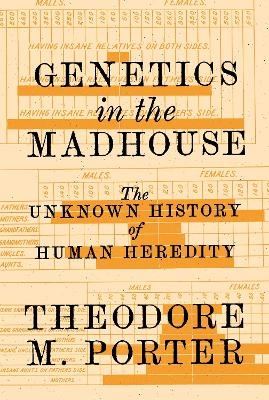
Genetics in the Madhouse
The Unknown History of Human Heredity
Seiten
2020
Princeton University Press (Verlag)
978-0-691-20323-2 (ISBN)
Princeton University Press (Verlag)
978-0-691-20323-2 (ISBN)
The untold story of how hereditary data in mental hospitals gave rise to the science of human heredityIn the early 1800s, a century before there was any concept of the gene, physicians in insane asylums began to record causes of madness in their admission books. Almost from the beginning, they pointed to heredity as the most important of these
The untold story of how hereditary data in mental hospitals gave rise to the science of human heredity
In the early 1800s, a century before there was any concept of the gene, physicians in insane asylums began to record causes of madness in their admission books. Almost from the beginning, they pointed to heredity as the most important of these causes. Genetics in the Madhouse is the untold story of how the collection of hereditary data in asylums and prisons gave rise to a new science of human heredity. Theodore Porter looks at the institutional use of innovative quantitative practices—such as pedigree charts and censuses of mental illness—that were worked out in the madhouse long before the manipulation of DNA became possible in the lab. Genetics in the Madhouse brings to light the hidden history behind modern genetics and deepens our appreciation of the moral issues at stake in data work conducted at the border of subjectivity and science.
The untold story of how hereditary data in mental hospitals gave rise to the science of human heredity
In the early 1800s, a century before there was any concept of the gene, physicians in insane asylums began to record causes of madness in their admission books. Almost from the beginning, they pointed to heredity as the most important of these causes. Genetics in the Madhouse is the untold story of how the collection of hereditary data in asylums and prisons gave rise to a new science of human heredity. Theodore Porter looks at the institutional use of innovative quantitative practices—such as pedigree charts and censuses of mental illness—that were worked out in the madhouse long before the manipulation of DNA became possible in the lab. Genetics in the Madhouse brings to light the hidden history behind modern genetics and deepens our appreciation of the moral issues at stake in data work conducted at the border of subjectivity and science.
Theodore M. Porter is Distinguished Professor of History and holds the Peter Reill Chair at the University of California, Los Angeles. His books include Karl Pearson: The Scientific Life in a Statistical Age (Princeton).
| Erscheinungsdatum | 15.07.2020 |
|---|---|
| Zusatzinfo | 20 b/w illus. |
| Verlagsort | New Jersey |
| Sprache | englisch |
| Maße | 156 x 235 mm |
| Themenwelt | Geisteswissenschaften ► Geschichte |
| Geisteswissenschaften ► Psychologie | |
| Studium ► 2. Studienabschnitt (Klinik) ► Humangenetik | |
| Studium ► Querschnittsbereiche ► Geschichte / Ethik der Medizin | |
| Naturwissenschaften | |
| ISBN-10 | 0-691-20323-7 / 0691203237 |
| ISBN-13 | 978-0-691-20323-2 / 9780691203232 |
| Zustand | Neuware |
| Informationen gemäß Produktsicherheitsverordnung (GPSR) | |
| Haben Sie eine Frage zum Produkt? |
Mehr entdecken
aus dem Bereich
aus dem Bereich
Eine sehr persönliche Geschichte | Der New York Times-Bestseller
Buch | Softcover (2023)
Ullstein Taschenbuch Verlag
21,99 €
Die revolutionäre Medizin von morgen (Lifespan)
Buch | Softcover (2020)
DuMont Buchverlag
16,00 €


